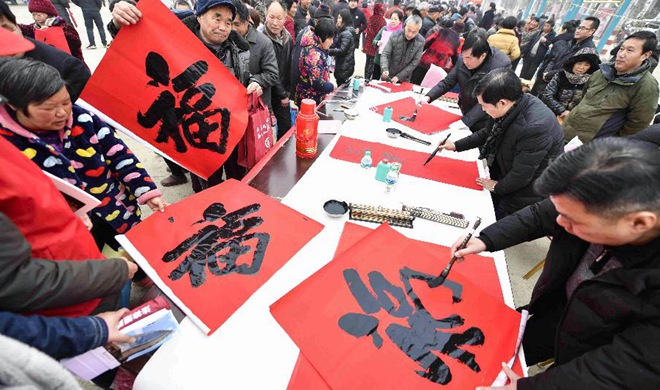FUZHOU, Jan. 18 (Xinhua) -- Taking a jacket off a plastic model, Hu Niuzai reached for the inside pocket, pulled out a cord and plugged it into a power bank.
"That's it, now the down jacket is warming up," said Hu, technology executive at Fujian Septwolves Industry Company, a garment maker in east China's Fujian Province.
The heat-generating jacket is the company's latest foray into smart clothing and was released in late November.
The down jacket uses graphene, a material that can generate heat when given a low voltage charge with a low risk of electricity leakage.
"It will warm up in just 30 seconds, and is safe," said Hu. "It offers three temperature options from 35 degree Celsius to 55 degree Celsius."
The jackets have been distributed to more than 2,000 stores in China, and Hu said the company will further explore the smart clothing market.
"We plan to spend about 50 percent of our company's revenue developing smart clothing, as well as upgrading our assembly line," he said.
The company is headquartered in Jinjiang, a textile manufacturing hub in east China, a cluster of the country's most well-known sports shoe and male garment brands.
In recent years, the local government has been promoting its garment industry to shift from labor-intensive manufacturing to tech-driven automated production.
As the smart clothing industry picks up steam, local firms are combining fashion with high-tech including using new materials, electronic accessories, and embedding sensors.
The smart clothing market is expected to exceed 4 billion U.S. dollars by 2024, according to a report released by Global Market Insight, a market research and strategy consulting firm.
Rising awareness of health coupled with an increased desire to monitor bodily functions such as blood pressure and heart rate will boost the demand for smart clothing, said the report.
Global fashion brands and technology firms have all joined the market.
In September, Levi's teamed up with Google to release a cycling-friendly denim jacket with bluetooth control for phones. Apple published three patents for smart fabrics on the second half of last year.
"Technology is a growing market," said Peng Haitao, head of Marketing Department at Fujian Qipai Group. "The traditional clothing industry should not miss the opportunity."
The company started making smart clothing in 2016. In late 2017, it released an upgraded smart jacket with a health and activity monitoring wristband in the cuff.
The company has set its eyes on the global market.
"We have done market research. Smart jackets have been well accepted by sport and fitness fans in Europe," said Shi Chunpin, head of Qipai's Research and Development Department.
"Smart clothing is the future," said Peng, "we want to create room for consumer's imagination."

















